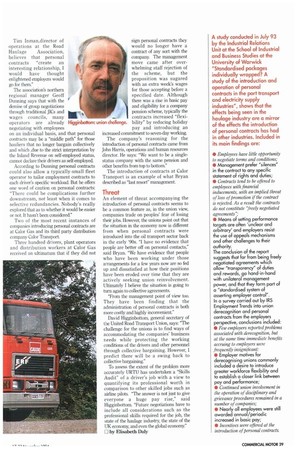• Employees have little opportunity to negotiate terms and conditions;
Page 31

If you've noticed an error in this article please click here to report it so we can fix it.
• Management prefer "silences" in the contract to any specific statement of rights and duties; • Contracts tend to he offered to employees with financial inducements, with an implied threat of loss of promotion if the contract is rejected. As a result the contracts do not constitute "freely negotiated agreements"; • Means of setting performance targets are often 'unclear and arbitrary' and employers resist the use of appeals mechanisms and other challenges to their authority. The conclusion of the report suggests that far from being freely negotiated agreements which allow "transparency" of duties and rewards, go hand-in-hand with unilateral management power, and that they form part of a "standardised system of asserting employer control". In a survey carried out by IRS Employment Trends into union derecognition and personal contracts from the employers perspective, conclusions included: • Few employers reported problems associated with derecognition, but at the same time immediate benefits accruing to employers were frequently insigruficant: • Employer motives for derecognising unions commonly included a desire to introduce greater workforce flexibility and to establish a closer link between pay and performance; • Continued union involvement in the operation of disciplinary and grievance procedures remained in a number of companies; • Nearly all employees were still awarded annual/periodic increased in basic pay;
• Incentives were offered at the introduction of personal contracts






















































































































